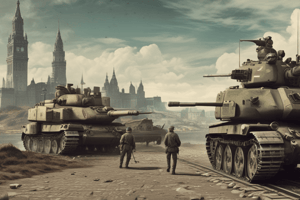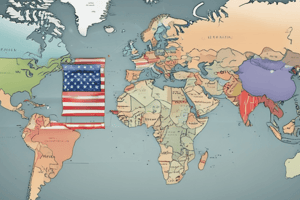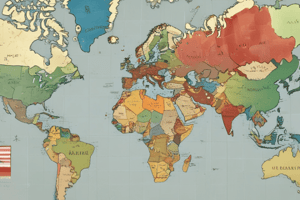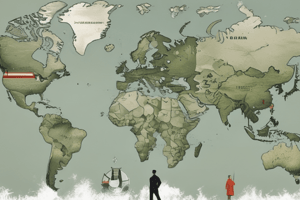Podcast
Questions and Answers
What was one of the main causes of World War I?
What was one of the main causes of World War I?
- The assassination of Archduke Franz Ferdinand
- The rise of nationalist movements (correct)
- The introduction of tank warfare
- The Battle of the Somme
What was the name of the alliance between France, Britain, and Russia?
What was the name of the alliance between France, Britain, and Russia?
- The Allied Forces
- The Central Powers
- The Triple Alliance
- The Triple Entente (correct)
What was the name of the battle that halted the German advance on Paris in 1914?
What was the name of the battle that halted the German advance on Paris in 1914?
- The Battle of the Somme
- The Battle of the Marne (correct)
- The Battle of Verdun
- The Battle of Ypres
What was the significance of the Battle of Cambrai?
What was the significance of the Battle of Cambrai?
What was the name of the alliance between Germany, Austria-Hungary, and Italy?
What was the name of the alliance between Germany, Austria-Hungary, and Italy?
What was the name of the battle that resulted in over 1 million casualties?
What was the name of the battle that resulted in over 1 million casualties?
What was one of the underlying causes of World War I?
What was one of the underlying causes of World War I?
What was the name of the campaign that aimed to capture the Dardanelles and take pressure off Russia?
What was the name of the campaign that aimed to capture the Dardanelles and take pressure off Russia?
Flashcards are hidden until you start studying
Study Notes
Causes of World War 1
- Imperialism: Competition for colonies and resources led to tensions between European powers.
- Nationalism: Rise of nationalist movements in various countries, including Serbia, Austria-Hungary, and Germany.
- Militarism: Build-up of military forces and arms races between European powers.
- Alliances: Complex system of alliances between European powers, including the Triple Entente (France, Britain, Russia) and the Triple Alliance (Germany, Austria-Hungary, Italy).
- Assassination of Archduke Franz Ferdinand: The murder of the heir to the Austro-Hungarian throne by Gavrilo Princip, a Serbian nationalist, on June 28, 1914, in Sarajevo, Bosnia.
Major Battles of World War 1
1914
- Battle of the Frontiers: Series of battles fought between French and German forces in August and September, resulting in heavy casualties and German occupation of parts of France.
- Battle of the Marne: Fought in September, this battle halted the German advance on Paris and led to a stalemate on the Western Front.
1915
- Battle of Ypres: Series of battles fought in April and May, resulting in heavy casualties and the introduction of poison gas by the Germans.
- Gallipoli Campaign: Allied forces attempted to capture the Dardanelles and take pressure off Russia, but were ultimately defeated by Turkish forces.
1916
- Battle of Verdun: Fought between February and December, this battle was one of the longest and bloodiest of the war, resulting in over 700,000 casualties.
- Battle of the Somme: Fought in July and November, this battle was one of the bloodiest of the war, with over 1 million casualties.
1917
- Battle of Cambrai: Fought in November and December, this battle saw the introduction of tank warfare and initial Allied successes, but ultimately ended in a stalemate.
1918
- Spring Offensive: German forces launched a series of attacks on the Western Front, but were ultimately defeated by Allied forces.
- Hundred Days Offensive: Allied forces launched a series of attacks on the Western Front, resulting in the defeat of Germany and the end of the war.
Causes of World War 1
- Imperialism led to competition for colonies and resources, causing tensions between European powers.
- Nationalist movements rose in countries like Serbia, Austria-Hungary, and Germany, contributing to the war.
- Militarism led to a build-up of military forces and arms races between European powers, escalating tensions.
- A complex system of alliances, including the Triple Entente and the Triple Alliance, further complicated the situation.
- The assassination of Archduke Franz Ferdinand on June 28, 1914, in Sarajevo, Bosnia, triggered the war.
Major Battles of World War 1
1914
- The Battle of the Frontiers, fought between French and German forces, resulted in heavy casualties and German occupation of parts of France.
- The Battle of the Marne, fought in September, halted the German advance on Paris, leading to a stalemate on the Western Front.
1915
- The Battle of Ypres, fought in April and May, introduced poison gas by the Germans and resulted in heavy casualties.
- The Gallipoli Campaign, fought from February to January 1916, was an unsuccessful Allied attempt to capture the Dardanelles.
1916
- The Battle of Verdun, fought from February to December, was one of the longest and bloodiest battles, with over 700,000 casualties.
- The Battle of the Somme, fought in July and November, was one of the bloodiest battles, with over 1 million casualties.
1917
- The Battle of Cambrai, fought in November and December, saw the introduction of tank warfare but ultimately ended in a stalemate.
1918
- The Spring Offensive, launched by German forces, was ultimately defeated by Allied forces.
- The Hundred Days Offensive, launched by Allied forces, resulted in the defeat of Germany and the end of the war.
Studying That Suits You
Use AI to generate personalized quizzes and flashcards to suit your learning preferences.




